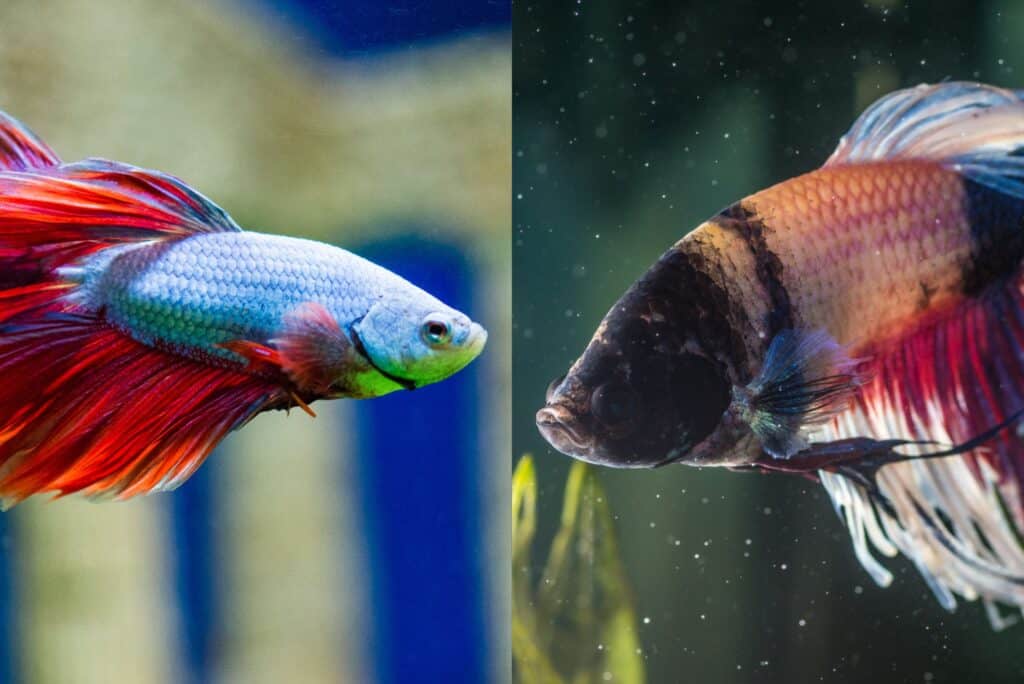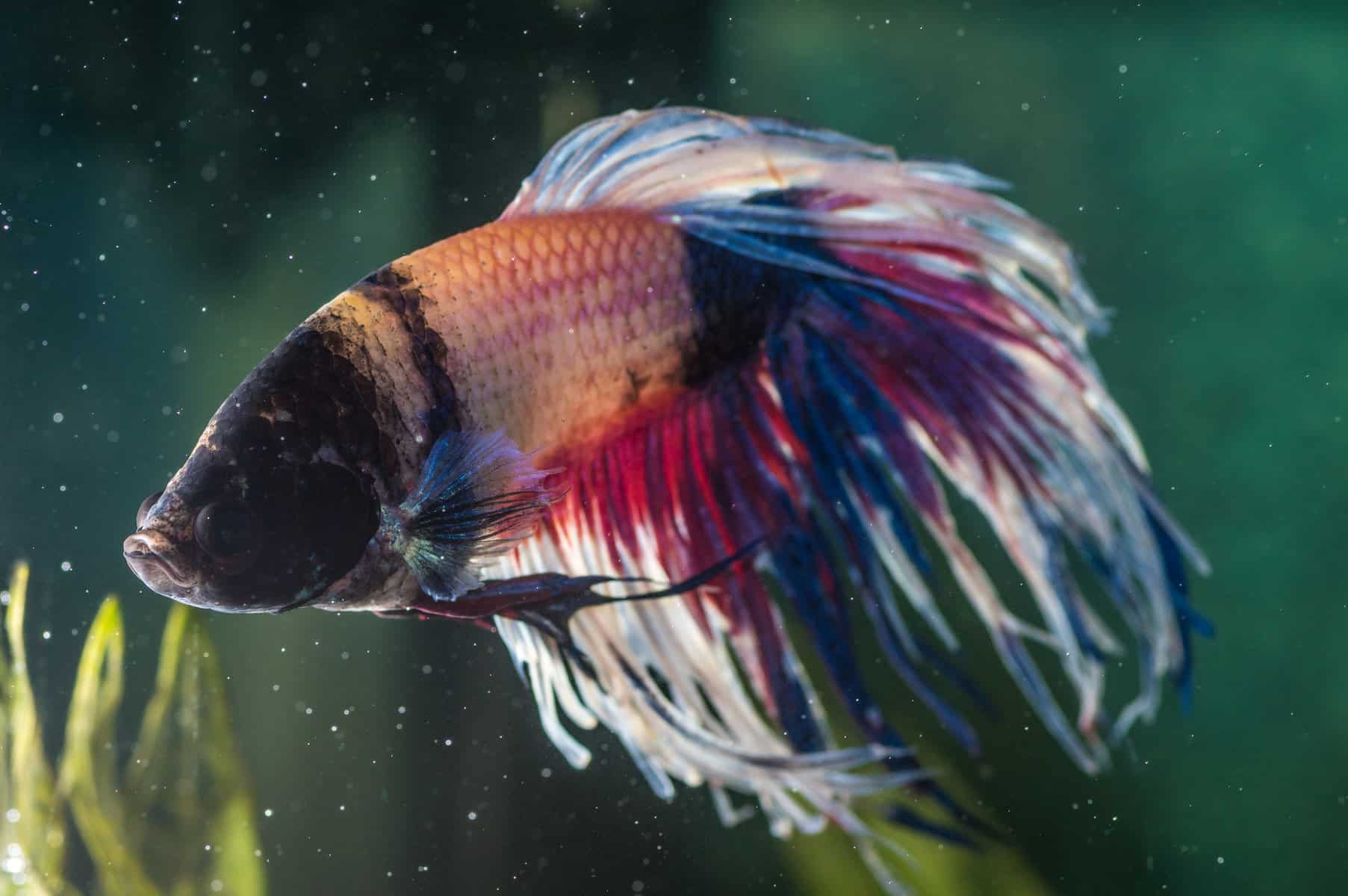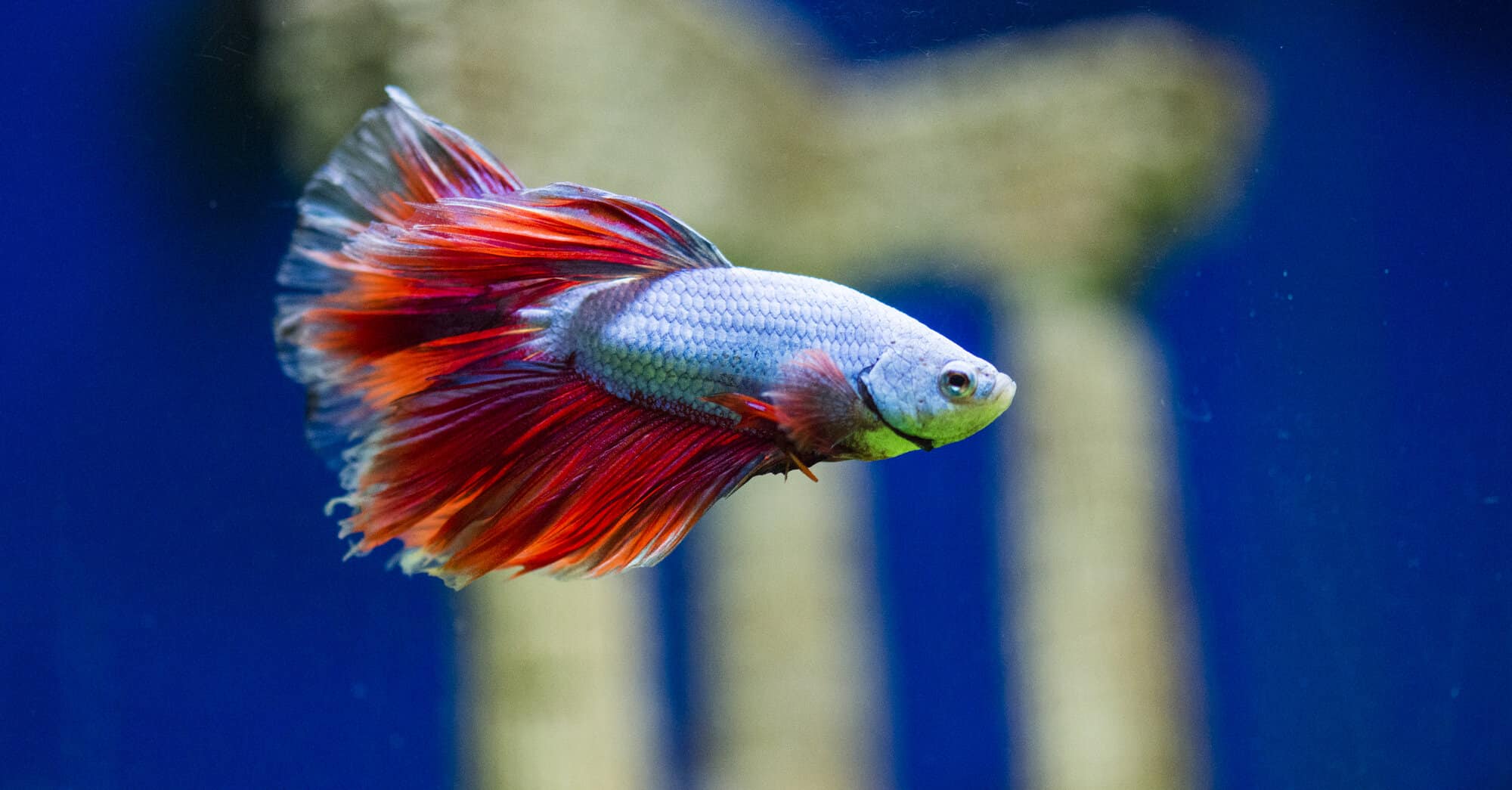Betta fish are beautiful creatures that thrive when given the right environment and a high-quality diet.
So, how do you tell if your betta fish is healthy or unhealthy?
Read this guide to find out what to look for in healthy vs. unhealthy betta fish.
How To Tell if Your Betta Fish Is Unhealthy
Experienced betta fish owners can tell at first glance if they have an unhealthy fish. However, novice betta owners often miss the telltale signs that something is wrong with their pet. Tragically, this can mean a sick fish might even die before treatment can begin.
In this part of our guide, we discuss some of the most common signs of an unhealthy betta and explain how to treat your fish when he’s sick.
Poor Appetite
Bettas are often greedy characters that eat whenever food is available. So, the most obvious sign that something is wrong with your fish is if it stops eating.
Depending on the cause of your pet’s lost appetite, you can often tempt your fish to eat by starving him for 48 hours. After that, offer your fish some frozen bloodworms or a tasty blanched, skinned pea.
Inactivity
Although bettas can be quite lazy, they do like to patrol their territory at intervals throughout the day. If your fish stops swimming around his tank, that could indicate a problem.
A common cause of inactivity in betta fish is simply boredom. Try adding some new plants or decorations to the tank, moving the existing decorations around, or introducing a simple toy. Often that’s all it takes to encourage your fish to become more active.
Bacterial Infections
Red patches, lumps, or ulceration on the betta’s skin and ripped, ragged fins indicate a bacterial infection.
You can try to treat the problem with an antibacterial medication that you’ll find at your local fish store.
White Spots
If your betta develops a rash of tiny white dots on his skin, fins, and gills, he’s probably suffering from White Spot or Ich Disease.
You can treat Ich with an over-the-counter medicine from your local pet or fish store.
Swollen Belly
Betta fish can suffer from constipation, which causes the belly to become swollen. Constipation can often be treated successfully by fasting your betta for 48 hours and then feeding him a blanched, skinned pea or some frozen meaty food.
However, a swollen belly can also be caused by a very serious condition called dropsy. You can read more about dropsy and how to treat it in the article at this link.
Poor Color
One of the reasons betta fish are so popular is their brilliant colors. If your betta’s colors aren’t as bright as usual, that could be a sign that your fish is sick or the water temperature is too low.
However, its colors tend to fade as the betta ages. So, if you have a senior betta, his loss of color could be part of the natural aging process.
Poor Growth
If your new fish doesn’t grow, that’s often a sign that he is unhealthy or his diet is incorrect.
Bettas are primarily carnivorous, although they eat algae and some plant matter. Examine your betta pet’s diet, and try increasing the proportion of frozen meaty foods.
Lazy Behavior
Although bettas are active, spending much of the day patrolling their environment, they are not especially lively fish. In fact, you will often see your betta buddy resting on a leaf or even on the substrate, apparently taking a nap.
However, bettas are naturally curious fish. So, if your fishy friend appears totally disinterested in his surroundings or has a low activity level, that could indicate that he’s sick.
Signs of a Healthy Betta Fish
A healthy, happy, thriving betta fish should display the following signs:
Color!
A healthy fish is brightly colored and vibrant. All the fish’s scales will be present, and the betta’s finnage should be complete with no splits or tears.
Normal Behavior
The territorial betta’s normal behavior involves patrolling his environment and checking out anything different, such as a new toy or plant.
But, even active fish rest periodically, taking a nap on flat leaves, the substrate, or in a betta hammock.
Appetite
Bettas can be quite greedy fish with a strong appetite, so you should expect your pet to be ready for his meals.
Many betta fish learn their feeding schedule and swim up and down the viewing panes waiting for their owner to approach with a meal.
Normal Swimming Behavior
Your betta should swim on an even keel. If your fish swims on one side, that’s indicative of a swim bladder problem, possibly caused by constipation or dropsy.
How To Treat an Unhealthy Betta Fish
The root causes of most betta problems are an unhealthy environment or poor diet.
Clean Your Betta Tank
Regularly cleaning your betta’s tank is absolutely necessary to maintain your pet’s health and proper water conditions.
First, use an aquarium water testing kit to check the nitrate levels in the water. Nitrates are toxic to fish, so if nitrate levels are over 30ppm (parts per million), you’ll need to carry out a partial water change immediately.
To begin with, you should only change around 25% of the water. Test the water again. If the nitrate levels are significantly reduced, that’s fine.
Use an aquarium vacuum cleaner to remove organic waste from the bottom of the tank, pushing the cleaner head deep into the substrate to remove pockets of dead air that could harbor bacteria.
Check the filter media to ensure that it isn’t clogged with sludge. Rinse the media in dirty tank water if necessary or replace spent media.
Going forward, be sure to carry out a partial water change of around 25% every week, and remember to check the nitrate levels with each water change.
Diet and Nutrition
Your betta’s basic diet should consist of betta pellets designed to float on the water surface.
In addition, bettas need a protein-rich element in their diet that includes meaty foods, such as frozen bloodworm, daphnia, and mosquito larvae.
Feed your betta twice daily, offering only what your fish will eat in a couple of minutes. It’s also a good idea to fast your fish for one day per week to help prevent constipation.
Give Your Betta a Salt Bath
If your betta has an external injury, you can give them a salt bath to help the healing process.
Final Thoughts
Did you enjoy our guide on what to look for in healthy betta fish vs. unhealthy? If you found the information helpful, please share the article!
To keep your betta thriving and happy, make sure that his tank is clean and well-maintained and feed your pet a correct, balanced diet.
Most minor fish diseases can be treated with medication that you can obtain from your local fish store, whose staff will be pleased to help you choose the right product.


